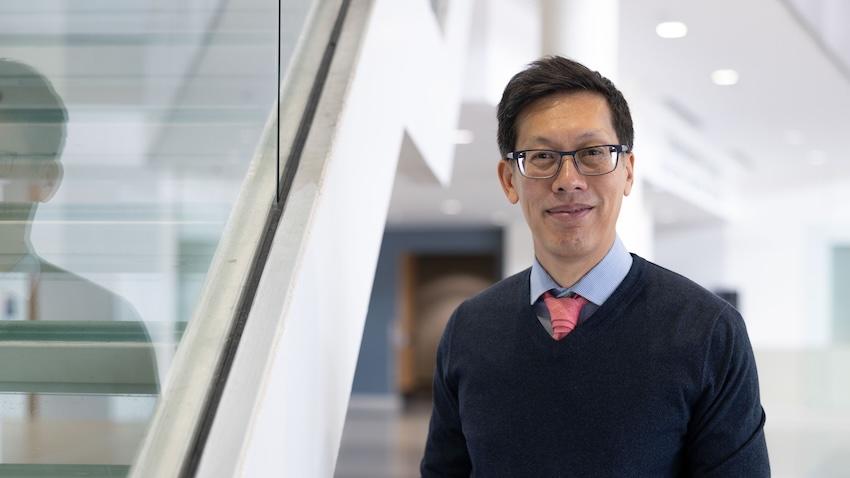
New Software Center Director to Lead Next Wave of Scientific Discovery
Scientists across Georgia Tech rely on powerful software tools to propel breakthroughs in fields ranging from physics to biology. Now, software experts who make that research possible are gaining a new leader.
The College of Computing named Professor Rich Vuduc as director of the Center for Scientific Software Engineering (CSSE). The Georgia Tech hub is dedicated to building reliable, high-performance software for scientists.
Under Vuduc’s leadership, CSSE strives to accelerate the pace and increase the quality of scientific discovery by developing custom software tools and best practices tailored to researchers’ needs.
“There is a reproducibility and reliability problem right now with scientific software,” Vuduc said. “The promise of CSSE is to leverage capabilities shared between Georgia Tech, Schmidt Sciences, and industry experts to address this problem.”
Issues arise because scientists often need to develop their own software for experiments or data analysis. However, troubleshooting coding issues and other bugs can slow down research.
To assist these scientists, CSSE receives their input to create custom software tools and best practices. The center employs professional software engineers who build and deliver products tailor-made to the needs of researchers at Georgia Tech and broader scientific communities.
Beyond its research focus, CSSE helps Georgia Tech fulfill its educational mission. The center provides students with direct access and exposure to real-world software engineering.
As the center enters its third year, Vuduc wants to better prepare students for employment by enhancing their hands-on experience while learning from CSSE engineers.
To achieve this goal, Vuduc is working to establish a Ph.D. fellowship program in which CSSE engineers mentor students. This program would connect academic inquiry with industry expertise, creating the next generation of dynamic leaders in computational science.
Vuduc also envisions pairing CSSE with Georgia Tech’s Vertically Integrated Projects (VIP) program. This approach would allow undergraduate students to earn class credit while working with CSSE engineers on large software engineering projects spanning multiple semesters.
“The center gives our students access to something that is very unique to find in a university environment,” Vuduc said.
“The software engineers in CSSE mostly come from industry. They have over 65 years of combined experience doing real-world software engineering that students can learn from.”
Vuduc is a 2010 recipient of the Gordon Bell Prize and a leading expert in high-performance computing (HPC). He was a finalist for the award in 2020 and 2022.
The Gordon Bell Prize, often referred to as the Nobel Prize in supercomputing due to the scope and magnitude of research it recognizes, celebrates achievement in HPC research and application.
Vuduc joined Georgia Tech in 2007 as one of the first faculty hired for the new Division of Computational Science and Engineering (CSE). Not a stranger of leading new units, he saw CSE begin offering M.S. and Ph.D. degrees in 2008 and attain school status in 2010.
Since 2021, Vuduc has served as co-director of the Center for Research into Novel Computing Hierarchies (CRNCH).
CRNCH is an interdisciplinary research center at Georgia Tech that explores technologies and approaches that will usher the next generation of computing. Areas CRNCH studies include quantum computing, brain-inspired computing, and approximate computing.
Vuduc will step down as CRNCH co-director to fulfill his role as CSSE director. The College of Computing will lead a search for CRNCH’s next co-director.
“In a sense, the CRNCH to CSSE transition was partly a natural one because one thing that contributes to software challenges is that hardware platforms are also changing and evolving very rapidly,” said Vuduc.
“People are exploring radically new hardware systems and we will have to write software configured for those too. Centers, like CRNCH and CSSE, strongly position Georgia Tech to lead these endeavors.”
Alessandro (Alex) Orso, the previous CSSE director, departed Georgia Tech earlier this year to become dean of the University of Georgia’s College of Engineering. Orso and Distinguished Professor Irfan Essa wrote the proposal to bring CSSE to Georgia Tech.
Georgia Tech formed CSSE in 2022 after securing an $11 million grant from Schmidt Sciences. Former Google CEO Eric Schmidt and his spouse, Wendy Schmidt, founded the philanthropic venture that funds science and technology research and talent networking programs.
Georgia Tech’s CSSE is part of Schmidt Sciences’ Virtual Institute for Scientific Software (VISS) program. This network helps scientists obtain more robust, flexible, scalable open-source software.
Schmidt Sciences is investing $40 million in VISS over five years at four universities: Georgia Tech, University of Washington, Johns Hopkins University, and University of Cambridge.
CSSE uses the funding to employ a software engineering lead, three senior and two junior software engineers. The Schmidt Sciences grant equips these engineers with computing resources to build scientific software. Along with the director, an advisory board guides the group’s work to meet the point of need for scientists in the field.
“I am grateful to Schmidt Sciences for their support of CSSE. It aligns with our college’s strategic goals and expertise in scientific software, and I am delighted that Rich has agreed to take on this important role,” said Vivek Sarkar, Dean and John P. Imlay Jr. Chair of Computing.
“I know that Rich is committed to growing CSSE's internal and external visibility and long-term sustainability. I am confident that he will also help further socialize CSSE among internal stakeholders across Georgia Tech.”


